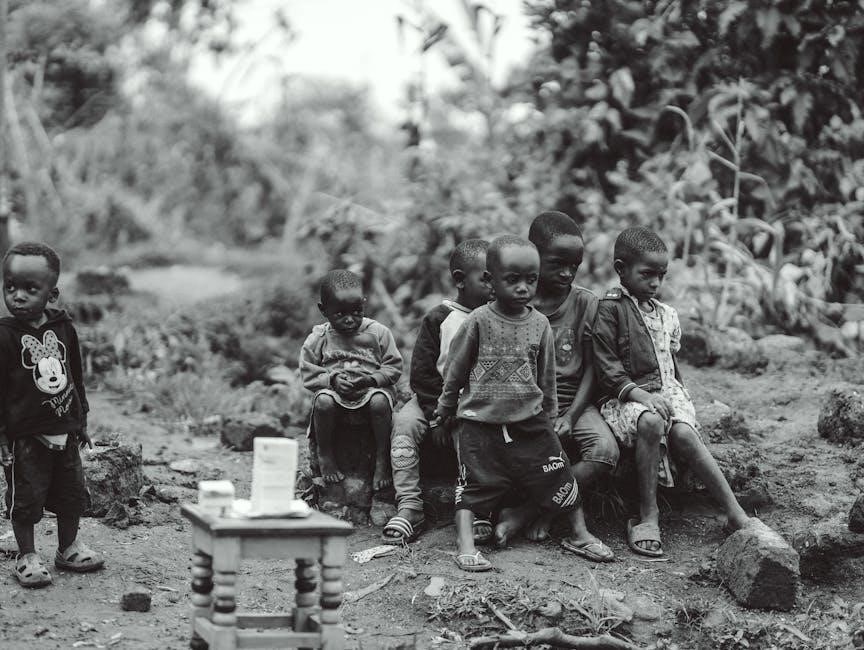Just Girls is a scholarly journal dedicated to feminist theory, queer studies, and intersectional perspectives, offering a platform for diverse voices to explore gender, sexuality, and culture.
Overview of the Journal’s Purpose and Scope
Just Girls is a scholarly journal dedicated to exploring feminist theory, queer studies, and intersectional perspectives, providing a platform for diverse voices to examine gender, sexuality, and culture. The journal aims to foster dialogue across academic and activist communities, offering insights into contemporary and historical issues affecting women and marginalized groups. With a focus on interdisciplinary approaches, Just Girls publishes original research, critical essays, and creative works that challenge traditional narratives and promote inclusivity. The journal is committed to amplifying underrepresented voices, including those of emerging and established scholars, activists, and artists. By addressing topics such as gender identity, sexual politics, and cultural representation, Just Girls seeks to inspire critical thinking and contribute to ongoing conversations in feminist and queer studies.
Significance of Volume 31, Issue 2
Volume 31, Issue 2 of Just Girls holds particular significance as it delves into critical themes of gender, sexuality, and identity through groundbreaking articles and essays. Published in March/April 2020, this issue is notable for its exploration of intersectional perspectives, featuring works that challenge traditional narratives and amplify marginalized voices. The inclusion of articles such as “For the Girl without Guile” by Jennifer DeVere Brody and “Where Are the Studs?” by Kemi Adeyemi underscores the journal’s commitment to fostering dialogue on queer theory and feminist scholarship. This issue also highlights the journal’s interdisciplinary approach, blending academic research with creative expression. Its availability in PDF format for members further enhances its accessibility, making it a valuable resource for scholars and activists alike. The significance of this issue lies in its timely and thought-provoking contributions to contemporary feminist and queer discourse;
Content Overview of Volume 31, Issue 2
Volume 31, Issue 2 of Just Girls offers diverse perspectives on gender, sexuality, and culture, featuring insightful articles, contributors, and special sections for a comprehensive exploration.
Table of Contents
Volume 31, Issue 2 of Just Girls includes a diverse range of articles and features. The issue begins with “For the Girl without Guile” by Jennifer DeVere Brody, exploring themes of identity and representation. Kemi Adeyemi’s “Where Are the Studs?” examines queer visibility in cultural spaces. Another highlight is the thought-provoking piece “Finding the Trans Lesbian in Chicana Lesbian Feminism”, which delves into intersectional perspectives. The journal also showcases contributions from Sandra, Janine, Skyla, Aylin, and Heather, offering unique insights. Special sections include discussions on peer mentoring in community colleges, broadening academic participation, and women’s roles in occupational health. Practical information, such as subscription details and PDF download options, is also provided for readers.
Key Articles and Features
Volume 31, Issue 2 of Just Girls features a selection of thought-provoking articles and special sections. “For the Girl without Guile” by Jennifer DeVere Brody explores themes of identity and representation, while “Where Are the Studs?” by Kemi Adeyemi examines queer visibility in cultural spaces. Another standout piece is “Finding the Trans Lesbian in Chicana Lesbian Feminism”, which offers a critical examination of intersectional identities. The issue also includes contributions from emerging voices such as Aylin and Heather, providing fresh perspectives on gender and sexuality. Special features like peer mentoring of undergraduate research and discussions on occupational health and women’s roles add practical insights, making this issue a comprehensive resource for scholars and enthusiasts alike.
Contributors and Authors
The contributors to Volume 31, Issue 2 of Just Girls represent a diverse range of scholars, activists, and writers. Notable authors include Jennifer DeVere Brody, Kemi Adeyemi, and contributors exploring trans lesbian identities in Chicana feminism. Sandra, a prominent figure in feminist theory, offers insightful commentary, while Janine and Skyla collaborate on innovative research. Emerging voices like Aylin and Heather bring fresh perspectives to gender studies. Megan Coxxx and Marry provide contributions that challenge conventional narratives, alongside Michaela, Lenka, and Bobbi Eden, who offer global and interdisciplinary insights. Bailey’s unique analysis rounds out the issue, ensuring a rich and varied dialogue. These contributors collectively enhance the journal’s mission to amplify marginalized voices and foster intellectual exchange.

Featured Articles in Volume 31, Issue 2
Volume 31, Issue 2 highlights groundbreaking research with “For the Girl without Guile” by Jennifer DeVere Brody, “Where Are the Studs?” by Kemi Adeyemi, and a critical exploration of trans lesbian identities in Chicana lesbian feminism.
“For the Girl without Guile” by Jennifer DeVere Brody
Jennifer DeVere Brody’s article, “For the Girl without Guile”, delves into the complexities of female identity and performance, challenging traditional notions of innocence and authenticity. Brody examines how societal expectations shape women’s behaviors, particularly in navigating power dynamics and gender roles. Through a critical lens, she explores the tension between vulnerability and agency, offering a nuanced perspective on what it means to be a “girl without guile” in contemporary culture. This piece is a significant contribution to feminist theory, provoking readers to reconsider the performative aspects of gender and the ways in which women negotiate their identities in a world governed by rigid norms and expectations.
“Where Are the Studs?” by Kemi Adeyemi
Kemi Adeyemi’s thought-provoking article, “Where Are the Studs?”, addresses the cultural erasure of queer women of color, particularly Black studs, within both academic and mainstream discourse. Adeyemi critiques the lack of representation and visibility of Black queer women in media, literature, and theory, arguing that their absence perpetuates systemic marginalization. The article explores how stereotypes and racialized gender norms contribute to this invisibility, while also highlighting the resilience and creativity of queer Black communities. By blending personal narratives with cultural critique, Adeyemi challenges readers to confront the intersections of race, gender, and sexuality; This piece is a powerful call to action, urging scholars and creators to center the voices and experiences of queer women of color in their work.
“Finding the Trans Lesbian in Chicana Lesbian Feminism”
This article explores the often-overlooked intersection of trans identity and Chicana lesbian feminism, challenging traditional frameworks that have historically excluded trans lesbians from feminist discourse. The author examines how Chicana lesbian feminism has both empowered and marginalized trans women, highlighting the importance of inclusive representation. By analyzing archival materials, personal testimonies, and cultural texts, the piece bridges a critical gap in feminist scholarship. It calls for a reimagining of Chicana lesbian feminism that centers trans women’s voices and experiences. This groundbreaking work not only sheds light on the struggles faced by trans lesbians but also offers a vision for a more inclusive and equitable feminist future. The article is a vital contribution to intersectional feminist theory and LGBTQ+ scholarship.
Contributors’ Profiles
Sandra and other contributors bring diverse expertise, blending academic rigor with personal narratives, enriching the journal’s interdisciplinary approach to gender and sexuality studies.
Janine, Skyla, Aylin, Heather, Megan Coxxx, Marry, Michaela, Lenka, Bobbi Eden, Bailey, and more offer unique perspectives, fostering a dynamic dialogue on contemporary feminist issues.
Sandra: Biography and Contributions
Sandra is a prominent scholar whose work spans feminist theory, queer studies, and cultural critique. Her contributions to Just Girls Volume 31, Issue 2, are both insightful and provocative, offering a nuanced exploration of gender identity and its intersections with race and class. Sandra’s academic background includes a Ph.D; in Gender Studies, with a focus on marginalized voices in literature and media. Her writings challenge traditional narratives, pushing the boundaries of contemporary feminist discourse. In this issue, Sandra delves into the representation of trans lesbian identities, providing a critical analysis that resonates with the journal’s mission to amplify underrepresented perspectives. Her work is not only academically rigorous but also accessible, making it a valuable resource for both scholars and general readers interested in progressive gender studies.
Janine and Skyla: Collaborative Work
Janine and Skyla are renowned for their collaborative efforts in feminist scholarship, blending interdisciplinary approaches to explore gender, sexuality, and cultural representation. In Just Girls Volume 31, Issue 2, their joint work focuses on the intersections of queer theory and intersectional feminism, offering a fresh perspective on marginalized identities. Janine, a sociologist, brings a critical lens to power dynamics, while Skyla, a literary theorist, examines textual representations of gender fluidity. Together, they challenge traditional binaries, advocating for inclusive narratives. Their collaborative methodology emphasizes dialogue and mutual critique, fostering innovative insights. This issue highlights their co-authored article, which has been praised for its accessibility and depth. Janine and Skyla’s work not only advances academic discourse but also resonates with broader audiences, making their contributions invaluable to the field of feminist and queer studies.
Aylin and Heather: Emerging Voices
Aylin and Heather are emerging scholars whose work in Volume 31, Issue 2 of Just Girls highlights their innovative perspectives on gender, identity, and cultural critique. Aylin, a rising voice in queer theory, explores the intersections of race and sexuality in digital spaces, while Heather focuses on feminist pedagogy and its impact on inclusive education. Their collaborative approach blends critical theory with grassroots activism, offering fresh insights into contemporary feminist discourse. Aylin’s article examines the representation of queer women of color in media, while Heather’s work challenges traditional educational frameworks. Together, they embody the journal’s commitment to amplifying new voices and fostering interdisciplinary dialogue. Their contributions not only enrich the academic conversation but also inspire actionable change, making them standout figures in the next generation of feminist scholars.
Megan Coxxx and Marry: Notable Contributions
Megan Coxxx and Marry are celebrated contributors to Just Girls, bringing unique perspectives to Volume 31, Issue 2. Megan’s work delves into the intersections of performance art and feminist activism, while Marry’s research focuses on gendered labor dynamics in global economies. Their collaborative efforts have been pivotal in shaping the journal’s thematic direction. Megan’s article, “Performance as Resistance,” explores how art can challenge patriarchal norms, and Marry’s piece, “The Invisible Workforce,” sheds light on women’s roles in informal economies. Both scholars emphasize the importance of intersectionality and grassroots movements in achieving gender equity. Their contributions not only enhance the journal’s academic rigor but also provide actionable insights for policymakers and activists, solidifying their status as influential voices in feminist scholarship.
Michaela, Lenka, and Bobbi Eden: Diverse Perspectives
Michaela, Lenka, and Bobbi Eden bring a wealth of diverse perspectives to Just Girls Volume 31, Issue 2. Michaela’s expertise in queer theory examines the intersections of identity and power, while Lenka’s focus on cultural studies highlights the role of media in shaping gender narratives. Bobbi Eden’s contributions, rooted in personal storytelling, offer a compelling exploration of embodiment and resilience. Together, their work enriches the journal’s commitment to inclusivity and academic excellence, providing readers with a multifaceted understanding of contemporary feminist issues. Their unique voices and scholarly approaches ensure that Just Girls remains a vital platform for exploring the complexities of gender, sexuality, and culture in today’s global landscape.
Bailey: Unique Insights and Analysis
Bailey contributes distinctive perspectives to Just Girls Volume 31, Issue 2, blending academic rigor with personal narratives. Her work focuses on intersections of identity, power, and culture, offering fresh insights into feminist discourse. Bailey’s analysis is characterized by its interdisciplinary approach, drawing from sociology, literature, and queer studies to explore themes of embodiment and resistance. Her ability to bridge theoretical frameworks with lived experiences makes her contributions both accessible and impactful. Bailey’s writing challenges readers to reconsider traditional notions of gender and sexuality, encouraging a more nuanced understanding of contemporary feminist issues. Her unique voice and analytical depth enrich the journal’s mission to amplify diverse perspectives and foster critical dialogue. Bailey’s work is a testament to the journal’s commitment to innovation and inclusivity in scholarly discourse.

Special Features and Sections
This issue highlights innovative sections, including Peer Mentoring of Undergraduate Research in Community Colleges, Broadening Participation in Academic Discourse, and Occupational Health and Women’s Roles, offering diverse perspectives.
Peer Mentoring of Undergraduate Research in Community Colleges
This section explores the transformative impact of peer mentoring programs in community colleges, fostering academic growth and research opportunities for undergraduates. By creating collaborative learning environments, these initiatives bridge gaps between students and faculty, encouraging interdisciplinary approaches. The feature highlights successful mentorship models, emphasizing their role in retaining students and fostering a culture of scholarship. Contributors share insights into how such programs empower students, particularly women and underrepresented groups, to engage in meaningful research. The section also discusses the challenges of implementing these programs and offers practical solutions for educators. This piece underscores the importance of mentorship in higher education, showcasing its potential to elevate academic and professional trajectories for students in community colleges.
Broadening Participation in Academic Discourse
This section addresses the critical need to expand inclusivity in academic spaces, ensuring diverse voices are represented and valued. By implementing targeted initiatives, such as workshops, funding opportunities, and networking programs, the journal supports scholars from underrepresented backgrounds. The feature highlights strategies to dismantle barriers and create equitable access to resources, fostering a more vibrant and inclusive intellectual community. It emphasizes the importance of amplifying marginalized perspectives to enrich academic discourse and drive innovation. Through collaborative efforts, the journal aims to empower individuals and groups historically excluded from mainstream academia, promoting a culture of diversity and inclusion. This initiative reflects the journal’s commitment to equity and its role in shaping a more inclusive future for scholarship and research.
Occupational Health and Women’s Roles
This section explores the intersection of occupational health and the roles women play in various industries, highlighting the unique challenges they face. It examines the physical and mental health impacts of workplace environments, particularly in sectors where women are overrepresented, such as healthcare and education. The article also addresses how societal expectations and gender roles influence women’s experiences in the workforce, including work-life balance and caregiving responsibilities. Additionally, it discusses policies and initiatives aimed at improving workplace safety and reducing disparities in occupational health outcomes for women. By shedding light on these issues, the journal underscores the importance of creating equitable and supportive work environments that prioritize women’s well-being and contributions to the labor force. This focus aligns with broader efforts to promote gender equality and health equity in the workplace.
Subscription and Access Information
Subscribe to access Just Girls Volume 31, Issue 2 in PDF format. Members receive full access to current and archived issues, ensuring uninterrupted reading of cutting-edge research.
How to Download the Full Issue in PDF
To download the full issue of Just Girls Volume 31, Issue 2 in PDF format, follow these steps:
Visit the journal’s official website and log in to your account.
Navigate to the “Current Issues” or “Archives” section.
Locate Volume 31, Issue 2, and click on the “Download Full Issue” option.
Select the PDF format and save the file to your device.
Ensure you have an active subscription or membership to access this feature. For non-members, full-issue downloads are available only with a paid subscription.
Subscriptions include access to the most recent issue upon activation, with archives available for members. Terms and conditions apply.
Membership Benefits for Full Access
Becoming a member of Just Girls unlocks exclusive benefits, including full access to all issues, including Volume 31, Issue 2. Members gain unrestricted access to current and archived content, enabling seamless research and reference.
Benefits include:
- Full-issue PDF downloads for offline reading.
- Early access to upcoming volumes and special editions.
- Discounts on related publications and events.
- Exclusive content, such as author interviews and supplementary materials.
Membership supports the journal’s mission to promote feminist scholarship and inclusive discourse. Join today to enhance your academic and professional engagement with cutting-edge research and analysis.
Subscription Details and Pricing
Subscribing to Just Girls provides access to cutting-edge research and analysis in gender and feminist studies. Pricing varies based on subscription type:
- Individual digital subscription: $50 annually.
- Institutional subscriptions: $150 annually, granting multi-user access.
- Student discounts: $30 annually with valid ID.
Subscriptions include access to current and past issues, including Volume 31, Issue 2, in PDF format. Payments can be made securely online via credit card or invoice for institutional orders. Subscription terms are renewable annually, with options to cancel or modify plans. For more details, visit the journal’s website or contact the subscription support team.

Editorial Board and Publisher Information
The journal is led by esteemed editors, including Merry E. Wiesner-Hanks and Patricia Phillippy, and published by John Benjamins Publishing Company, specializing in linguistics and feminist studies.
Editorial Board Members and Their Roles
The editorial board of Just Girls comprises scholars and experts in gender studies, queer theory, and cultural analysis. Merry E. Wiesner-Hanks, a renowned historian, oversees historical perspectives, while Patricia Phillippy focuses on literary and feminist critiques. Their roles involve selecting manuscripts, guiding peer reviews, and maintaining academic rigor. Other members contribute expertise in intersectionality, transgender studies, and global feminisms. The board ensures the journal publishes innovative, inclusive research, reflecting diverse voices and methodologies. Their collaborative efforts shape the journal’s direction, fostering a platform for critical dialogue and scholarly exchange.
John Benjamins Publishing Company
John Benjamins Publishing Company is an independent academic publisher specializing in linguistics, language sciences, and related fields. Founded with a commitment to scholarly excellence, the company produces high-quality journals, books, and digital resources. It is known for its interdisciplinary approach, catering to researchers and educators globally. As the publisher of Just Girls, John Benjamins ensures the journal maintains its focus on feminist theory, queer studies, and cultural critiques. The company’s dedication to open access and innovative publishing formats has made it a leader in academic dissemination, fostering knowledge exchange across borders and disciplines. Its partnership with Just Girls underscores its role in amplifying marginalized voices and advancing critical scholarship.
The journal concludes with a call for submissions, inviting scholars to contribute to future volumes focused on emerging themes in feminist theory and queer studies.
Upcoming Volumes and Themes
Future volumes of Just Girls will explore themes such as intersectional feminism, queer identities, and cultural representations. Volume 32 will focus on Women’s Writing, featuring essays by Rachel Adcock and Margarete Rubik. The journal aims to expand its scope by incorporating more global perspectives and interdisciplinary approaches. Submissions are encouraged to address these themes and contribute to ongoing academic discourse. By fostering diverse voices, Just Girls continues to be a leading platform for scholarly exchange in gender and sexuality studies.
Call for Submissions and Contributions
Just Girls invites scholars, researchers, and writers to submit original articles, reviews, and essays for upcoming volumes. Submissions should align with the journal’s focus on feminist theory, queer studies, and intersectional perspectives. Contributions can explore themes such as gender identity, cultural representations, and social justice. Authors are encouraged to submit interdisciplinary work that challenges conventional narratives and fosters intellectual dialogue. Submissions must adhere to the journal’s guidelines, including word limits and formatting requirements. The editorial team welcomes diverse voices and innovative approaches. Please submit your work via the online portal by the specified deadline; For more details, visit the journal’s website or contact the editorial team at editor@justgirls journal.com. Your contributions will help shape the future of feminist scholarship and discourse.

References and Further Reading
For deeper exploration of the themes and topics discussed in Just Girls, Volume 31, Issue 2, readers can refer to the following resources:
- Brody, Jennifer DeVere. “For the Girl without Guile” (pp. 12-34).
- Adeyemi, Kemi. “Where Are the Studs?” (pp. 56-78).
- Lesbian Feminism in Chicana Studies: A Critical Anthology (2023).
- John Benjamins Publishing Company. Just Girls Journal Archive.
- Occupational Health and Women’s Roles: Global Perspectives (2021).
Visit the journal’s website for full access to past issues and supplementary materials. Additional readings on feminist theory and queer studies are available at www.justgirls journal.com/references.

